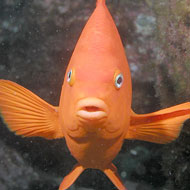
Mucus protects young fish from bacteria and viruses
US researchers have identified bacteria in fish that could protect against known human pathogens.
The research, which will be presented at a meeting of the American Chemical Society, identified the bacteria in the protective mucus that coats young fish.
The mucus protects fish against viruses, fungi and bacteria in their environment before they can cause infections. The slime is also high in polysaccharides and peptides which are known to have antibacterial activity.
Molly Austin from Oregon State University, who conducted some of the research, said: “Fish mucus is really interesting because the environment the fish live in is complex. They are in contact with their environment all the time with many pathogenic viruses.”
In the study, researchers isolated and screened 47 different strains of bacteria from the slime. Five bacterial extracts showed strong resistance to inhibited methicillin-resistant S. aureus (MRSA), and three repelled Candida albicans - a fungus pathogenic to humans.
Furthermore, a bacteria derived from a particular Pacific pink perch showed strong resistance against MRSA and against a colon carcinoma cell line.
The mucus had been swabbed from young deep-sea and surface-dwelling fish caught off the coast of Southern California. Researchers say they examined young fish because they have a less-developed immune system and more mucus on the outside of their scales.
The team are now interested to see if there is anything in the mucus that could help to protect humans. They are also looking to explore where fish mucus could help reduce the use of antibiotics in fish farming.
Before this, however, the researchers aim to see if the bacteria they studied were typical of the fishes’ microbiomes, or if they just happened to hitch on for a ride at the time of sampling.
Image (C) Aquaimages/Wikimedia



 The latest
The latest